Image a: Elevated view of Griffiths Stadium nearing completion, minus stands; an intervarsity rugby game seems to be underway. University buildings in background looking north (l to r): Saskatchewan Hall, Qu'Appelle Hall, Dean of Agriculture's residence, Chemistry, Physics, Administration, Crop Science, Rutherford Rink, and Livestock Pavilion.
Image b: Elevated view looking northwest at Griffiths Stadium and campus buildings in background. Taken from the roof of the School for the Deaf. Immature landscaping in foreground.
Bio/Historical Note: Details about the rugby game from "The University of Saskatchewan / 1909-1959", pg. 19.
Bio/Historical Note: Prior to 1936, the University of Saskatchewan football team played its home games at Cairns Field on the corner of Avenue A (now Idylwyld Drive North) and 25th Street West. Athletic Director E.W. (Joe) Griffiths longed for a ‘‘home field’’ and had lobbied for its construction since his arrival on campus in 1919. Merits of the project were debated back and forth but little progress was made. In 1935 a student-organized bowling tournament raised $275 and kick-started the process. C.J. Mackenzie, first Dean of Engineering, next seized the initiative by organizing and chairing the U of S Stadium Fund Association. The plan was to fund construction in stages with donations from “students, graduates, faculty and well-wishing business men of the community.” Architectural plans, supplied “gratis” by faculty of the College of Engineering, envisioned a structure costing $25,000 whose final stages would include a grand entrance, bus mall, dressing rooms, showers, etc. The corner of College Street and Cumberland Avenue, site of the ill-fated 1912 City Hospital project, was chosen as the stadium location. Although tenders were initially called for, the University decided to build the project itself using primarily student labour. With the Depression showing no signs of lifting, the University saw the stadium as an opportunity to give financial aid to several students who were in danger of having to discontinue their studies. Sod was turned 17 May 1936, under the supervision of Professor A.R. Greig, Superintendent of Buildings; construction was carried out through the summer. The first stage of the original Griffiths Stadium was officially opened 3 October 1936 amid speeches, bands and a parade. In front of 2,000 fans, the University of Saskatchewan Huskies beat the Alberta Golden Bears 5-3. Decades later, the widening of College Drive and the desire for a new stadium combined to fuel construction of today’s Griffiths Stadium, a few hundred metres east of the original site. It was officially opened 23 June 1967. Improvements were made in 1988 to accommodate the 1989 Jeux Canada Games.

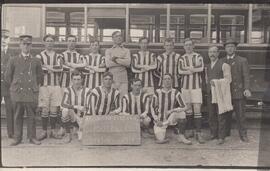
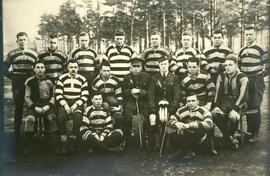
![University of Saskatchewan Rugby [Football] Team - Group Photo](/uploads/r/university-of-saskatchewan-archives/e/3/2/e329dd50dd8636270b7c605032ec913568ef3c14593636d3f518334f474bb4c2/A-7381_142.jpg)
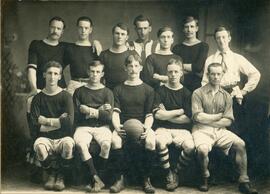
![University of Saskatchewan Huskies Rugby [Football] Team - Player Photos](/uploads/r/university-of-saskatchewan-archives/2/e/f/2ef52600d7507cfa85328e2f85f50522e00bbb5a3437f062642de1f811bad0e4/a-6007_142.jpg)
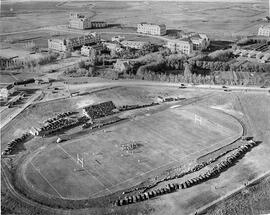
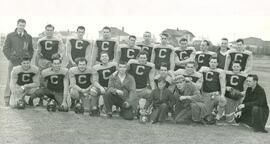
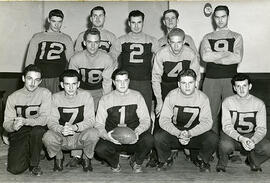
![University of Saskatchewan Rugby [Football] Team - Galen Heffelfinger](/uploads/r/university-of-saskatchewan-archives/9/4/b/94bc451318213bf3ce48e660054cfe667c9b7516d13c46f6e0caf9f5f65505a7/a-1049_142.jpg)
![University of Saskatchewan Huskies Rugby [Football] Team - Robert Shore](/uploads/r/university-of-saskatchewan-archives/f/b/b/fbb56c29d055b62f413bebd19d0451668e26100799a3e999b81f52c8bf70ac86/A-1050_142.jpg)
![University of Saskatchewan Rugby [Football] Team - Group Photo](/uploads/r/university-of-saskatchewan-archives/7/1/6/716c3df5e79172d02f023b3ce4b770bd505321e39de1f7848e6f89f301a4715d/a-6288_142.jpg)
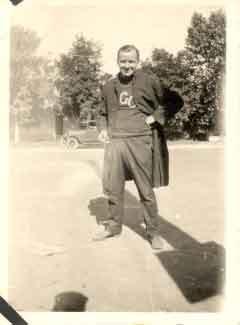
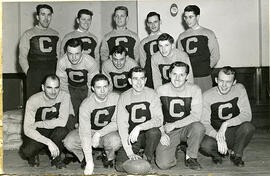
![University of Saskatchewan Rugby [Football] Team - Group Photo](/uploads/r/university-of-saskatchewan-archives/5/d/e/5de744f460a65e26760734d30454bc4c6ab7f9f72a062554682e136fc5729dc7/b-77_142.jpg)
![University of Saskatchewan Rugby [Football] Team - Player Photos](/uploads/r/university-of-saskatchewan-archives/8/4/b/84b073b1d351fc95a61608be1ebd57379b267c6ab6cc313c3d73550373098ea8/b-79_142.jpg)